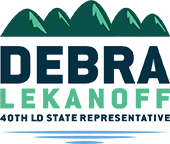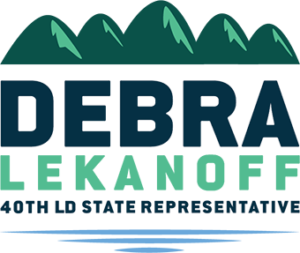Supporting Seven Generations to Come on Fantastic Friday
Dear Friends,
Last month, shortly before former Speaker Kevin McCarthy was removed from the position, Congress passed a continuing resolution to fund the federal government and avoid a government shutdown.
That continuing resolution – or CR – was scheduled to expire today, and if Congress and the President had not agreed on a funding plan the government would have shutdown while they continued to work on a funding plan.
Thankfully, President Biden signed a short-term government funding bill yesterday after it passed the House of Representatives and the Senate!

The bill, designed by new House Speaker Mike Johnson, who we talked about a few weeks ago when he was elected to the position, will fund four federal agencies until January 19, 2024, and the rest until February 2, 2024, giving Congress additional time to negotiate long-term spending bills.
The bill signed by President Biden yesterday does not include additional funding either for Ukraine or Israel, which the President has said is urgently needed. This funding plan comes after weeks of infighting withing the Republican party, and passed with bipartisan support in both the House and the Senate.
I am thrilled that Congress and the President have averted a government shutdown once again, but we must keep our eye on the future and continue working to find long-term funding solutions. It is not sustainable to continue with short-term funding plans, and it is imperative that Congress come to the table and find common ground to continue supporting the American.
Keep an eye out for additional updates here as we move closer to the January and February deadlines.
Keep reading for more on this Fantastic Friday.
“Stay Safe, Stay Healthy”
Rep. Debra Lekanoff
Visiting the Didgwalic Wellness Center
A few weeks ago, we did a deep dive into the ongoing opioid crisis here in Washington State, and across the country. As I noted before, no community has been harder hit than our Native brothers and sisters.
Recently, I had the pleasure of visiting the Didgwalic Wellness Center in Anacortes with Governor Jay Inslee!

Walking through this wonderful facility, I felt my spirits lift as I thought about the future. Providing resources to those who need our help is so important, and this center is making addiction treatment accessible to victims of this opioid crisis.
Thank you, Governor Inslee, for joining me on this incredible visit! The entire staff was so welcoming and friendly, showing a deep sense of kindness and love that I am sure is felt by all of their patients.

As they write on their website:
“Our primary goal is to provide the community with quality health care solutions to today’s substance abuse disorder and mental health challenges. We have developed an integrated health care model designed for each individual client. Staff works closely with each client in a team setting to assist with the resources needed to sustain a life of recovery.”
This is an incredible organization, doing good work to help people who have fallen down. For more information about the Didgwalic Wellness Center, click here.
Centennial Accord
Over these last few years, we have talked multiple times about the Centennial Accords, and the annual meetings that happen between Washington’s tribes and various state agencies.
At the end of last month, it was my pleasure to attend the 34th Annual Centennial Accord Pre-Meetings and Annual Meeting at the Lucky Eagle Casino Resort!
Each year, leaders come together to confer and collaborate, always aiming to embody the guiding principles of the Accord to “better achieve mutual goals through an improved relationship between their sovereign governments.”

It was such a joy to once again participate in this vital dialogue, bringing to the table our tribal nations and state officials to discuss important issues impacting Washington’s tribes, and Washingtonians.
Thank you to everyone who joined us this year, both for your insightful contributions and your ongoing work to support these government-to-government relationships.

The Centennial Accord was established in 1989 in order to improve the government-to-government relationship between the federally recognized tribes of Washington State, and the Washington State government.
Since 2019, I have been working to pass House Bill 1640 with Craig Bill from the Governor’s Office of Indian Affairs. We started the process with the late retired Senator John McCoy, working closely with Chairman W. Ron Allen to ensure that our bill would support tribal nations and tribal-state relations as best as possible.
The bill, which was introduced in 2020 and 2021 but failed to become law both times, would implement the codified Centennial Accord Millennium Agreement, which, among other things, would encourage “the Washington Legislature to establish a structure to address issues of mutual concern to the state and tribes.”
These government-to-government relationships are so important, they allow us to ensure that everyone has their voice heard and a seat at the table. I will continue this work, always making sure that we are setting the stage for the next seven generations to come.
For some more information about the history of the Centennial Accord, check out this page on the Governor’s Office of Indian Affairs website.
Protecting the Salish Sea
As those who have read my newsletters and followed along with my work in Olympia, ensuring that we protect the natural beauty of Washington for the next seven generations to come has always been a top priority of mine.
Not only do we enjoy the beauty and resources of the Salish Sea, but there are so many creatures that call it home, and it is our responsibility to ensure that their habitats are protected so they may thrive and reproduce, as they have for countless generations.
As we look to next steps that we can take, I am working to ensure that all interested parties – the state and federal government in the United States, the Canadian government, and tribal nations – come together to collaborate and ensure that we take necessary and consistent precautions to protect this beautiful place on earth.
It is so important that we remain consistent in our regulations, ensuring that no matter where a vessel is flagged or whose sovereign waters they sail through, they are required to respect the Salish Sea, and tread carefully for those who call this place home.

As a 2021 report from the Washington State Department of Ecology wrote:
“The Salish Sea, which includes the Strait of Juan de Fuca, the Strait of Georgia, and Puget Sound, is a large and diverse waterbody. A wide variety of commercial, tribal, First Nation, and recreational vessels operate on these waters.
In 2018, nearly 5,000 commercial vessels called on Washington and Canadian ports within the Salish Sea (Washington State Department of Ecology, 2019a). Half of all oil moved in Washington State in 2018, 10 billion gallons, was transported by vessels (Washington State Department of Ecology, 2019b). Commercial and private ferries provide transportation links for passengers, vessels, and cargo in the US and Canada.
The Salish Sea is home to numerous federally recognized tribes and First Nations with treaty reserved aboriginal fishing and hunting rights. Commercial fishing vessels catch multiple species of fin and shellfish. Each year, thousands of people enjoy recreational fishing and boating throughout the Salish Sea.”
Over the years, I have been able to work with fellow legislators, scientists, activists, and more to determine how we can best help the Salish Sea, and what steps we can, and must, take in order to ensure its natural beauty and ecosystems are around for seven generations to come.
Protecting the Salish Sea is very close to my heart, and it’s something that remains a top priority of mine. This natural beauty is home to countless creatures and deserves our love and respect. Thank you to everyone who has made this a priority over the years. Together we will leave a better world for our grandchildren’s grandchildren.
An Update on the Drought in Washington
Earlier this year, we discussed my appointment to an important task force that addresses water usage during droughts.
The Joint Legislative Committee on Water Supply During Drought consists of four senators and four representatives, convening when drought conditions exist, or are expected to come within the next year, in order to ensure that Washington’s water supply is used and sustained correctly.
Over the summer, the Washington State Department of Ecology officially declared a drought emergency for 12 watersheds in parts of 12 counties.
Both Whatcom and Skagit county were included in the declaration, and the Nooksack River Basin is currently operating on emergency status. About 350 water customers are affected, according to the Department of Ecology, and that number will only grow as this emergency unfolds.

Earlier this month, the Joint Legislative Committee on Water Supply During Drought held a meeting to hear an update from the Department of Ecology, from Dave Christensen, Deputy Program Manager, Water Resources Program, Department of Ecology.
If you’d like to watch the meeting, click here.
According to Dave:
“Ecology currently has an emergency drought rule in effect, chapter 173-167 WAC Emergency Drought Funding, which is effective through November 20, 2023. Ecology may adopt subsequent emergency rules until the permanent rule is adopted.
We are considering amending the rule to:
- Provide a more effective, efficient, and transparent process for distributing funds during a drought emergency.
- Support good governance around providing relief during a drought emergency.”
As we’ve discussed in recent weeks, ensuring that all Washingtonians have access to potable water is a high priority of mine. As the drought work continues, I am becoming more and more grateful for the hard workers at the Department of Ecology who have rolled up their sleeves and done the difficult work to help Washingtonians.
There is still a lot of work to be done, and I’m glad to have this team around me. Keep an eye out for updates on the drought, and boosting Washingtonians’ water supplies in the future.
Protect Your Community!
Last month the Centers for Disease Control (CDC) Director Dr. Mandy Cohen endorsed the recommendation made by the agency’s committee of outside vaccine experts, approving a new COVID-19 booster shot that is recommended for everyone 12-years and older.
As we move into the Fall and Winter, it is important that we take these steps to protect ourselves and others. Updating our COVID-19 vaccines, and getting annual flu and RSV vaccines, is a strong way that we can help keep ourselves, and those around us, healthy.
Friends, by now we all understand the impact that each of us can have on preventing the spread of COVID-19 to those around us. Getting vaccinated remains the most powerful way that we can protect our communities.
For more information, click here.
Protecting Indigenous Women and People
Finally, this week an update on my ongoing work to address the Missing and Murdered Indigenous Women and People crisis in Washington, the United States, and around the world.
Earlier this month, I attended 2023 Annual Summit of the Washington State Missing and Murdered Indigenous Women and People Task Force, co-hosted by the Kalispel, Colville, Spokane, and Coeur D’Alene Tribes.

It was an incredible gathering of likeminded individuals, all working towards a common goal. There were countless representatives from Washington’s tribes and state agencies, all coming together in order to find the best path forward.
If you are interested in watching the summit, you can view Day One here, and Day Two here.

Thank you to everyone who joined us for this productive, enlightening meeting. Together we can accomplish so much, and continuing the dedicated work on this issue will have real, tangible impacts.
When issues are as plain to see as this one, it’s clear that we must take action. Addressing the crisis of Missing and Murdered Indigenous People in this country must continue to be a priority, and we must do everything we can to protect Native women and people.



